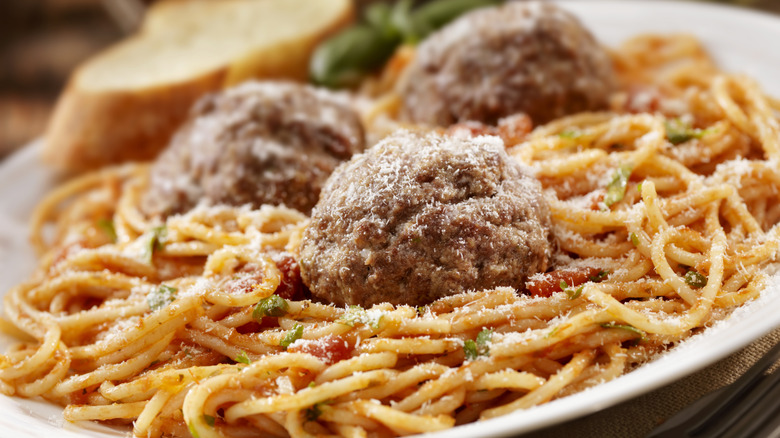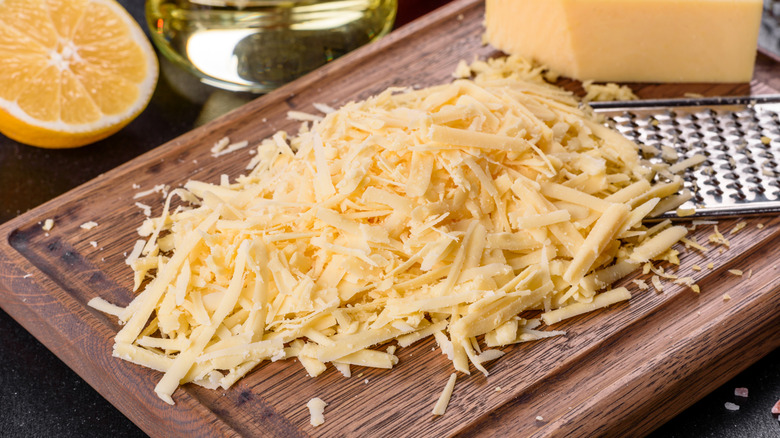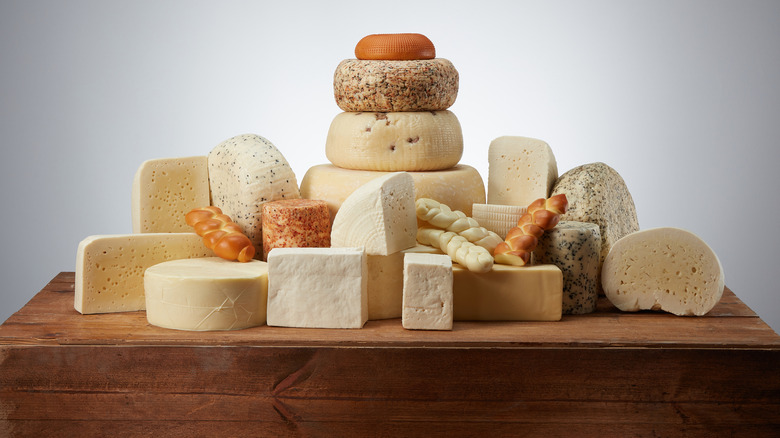For The Absolute Best Meatballs, Your Cheese Choice Matters
If you're making Italian-style meatballs, cheese is one of the crucial ingredients you shouldn't skip or worse, cheap out on. Whether it's parmesan, cheddar, or mozzarella, even a little bit of cheese mixed into the ground beef can add incredible flavor and depth to your meatballs. Unfortunately, not all cheeses — even if they're made from the same type — are created equal, and the kind you choose can make or break those delicious spaghetti and meatballs you're planning for dinner.
While pre-shredded or canned cheeses might seem like a convenient option, they're not your best bet for mouthwatering meatballs. These processed products often contain preservatives that can mute their flavor and dull out the distinct sharpness of their component cheese. For the tastiest results, opt for a block of cheese from your local deli or cheese shop and grate it yourself — trust us when we say that it's very much worth it to go the extra mile for this.
Why canned and pre-grated cheeses taste awful
Let's get the most important thing out of the way first: the canned and pre-grated cheeses that you find in supermarkets are made from real cheese. If the label says "parmesan," you're getting genuine parmesan. The only exception is when it's labeled as "processed" or "prepared cheese" – these products might contain some non-cheese ingredients, but at least half still has to be real cheese.
Now, even high-quality pre-shredded cheeses contain some additives. They use harmless preservatives like natamycin to prevent mold, and anti-clumping agents such as potato starch to keep the shreds from sticking together. While these additives are safe, they can affect how the cheese melts and feels in your mouth. In the past, some less scrupulous manufacturers even used fillers like cellulose (basically wood pulp) to bulk up their products, though regulators have since cracked down on this practice.
So, what's the takeaway? While pre-grated cheese is perfectly fine for many uses, making Italian meatballs isn't one of them. Stick with the real deal for the best results!
The best types of cheese for your meatballs
With that said, what are the best cheeses that you can get for meatballs? Parmesan is a classic. The sharp nuttiness goes together very well with the savoriness of the beef. You can also sprinkle a little bit of the cheese on top of the meatballs once they've come out of the oven, too. If you prefer a bolder flavor, Pecorino Romano can make a good swap for parmesan with its saltier and tangier flavor. Just use it sparingly, since it can be quite pungent.
You can also give mozzarella, the milder-tasting and softer cousin of parmesan, a shot. But its softness also gives rise to one of its greatest superpowers among the cheeses: it melts beautifully. If you prefer your meatballs with a gooey, pull-apart core, then it's the perfect cheese to stuff them with, or simply for layering on top.
Don't forget about pairing cheeses to serve alongside your meatballs. Crumbled feta can add a tangy kick, while aged cheddar can deepen the overall savoriness of a marinara-sauced spaghetti with ricotta beef meatballs. The beauty of cheese as a garnish is how it can transform the entire flavor profile of your meal, so don't be afraid to play around with different cheese combos. And of course, whatever type of cheese you choose, pick a fresh variation!


